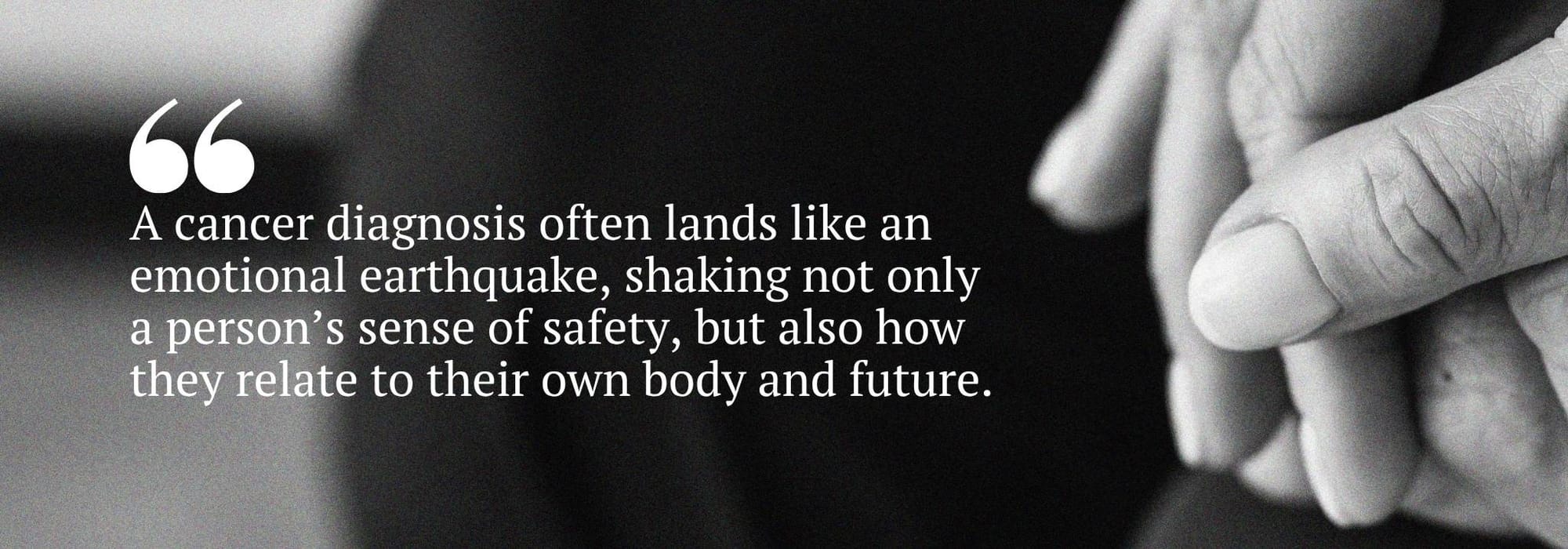From guilt to growth, Samantha shares her journey following a sarcoma diagnosis, what it can feel like to find out you have cancer, and the hidden aspects of the aftermath
How can someone who devoted their life to wellbeing end up with a cancer diagnosis? This was very much my reality – and even two years later, it’s something I still struggle to grasp.
A couple of days after receiving a letter from the Royal National Orthopaedic Hospital with the word ‘sarcoma’ printed on it, I found myself watching Pointless in the hospital waiting area (which now feels equally surreal and fitting), wondering how this was happening, and what was to become of me the moment my name was called.
A few weeks before, I had a painless lump removed from my abdomen, which no one had expected to be anything sinister. So, that day, 20 September 2023, when I was told by a specialist that I had an extremely rare form of cancer – angiofibroma with sarcomatous transformation, to be precise – the sense of shock hit me harder than I could’ve ever anticipated.
As sarcoma spreads most often to the lungs, the usual reality of work and family life became a blur of tests and scans, as well as re-excision surgery, to ensure complete removal of the tumour, and reduce potential recurrence.
Fortunately, my story ends well. But, I, like many others, still faced a significant mental health impact from the cancer diagnosis, along with a layered sense of loss that can emerge in the fallout, and struggled to process the myriad of emotions involved.
Getting to grips with a diagnosis
Hearing the word cancer can stir up feelings that are difficult to contend with, ranging from shock to anger, emotional numbness, and anxiety about the future, to name a few.
Despite the shock and concerns for my family, my first instinct was to put a plan of action together, and part of this was how to share the news. When it comes to children, this can be daunting to navigate – you naturally want to protect them from any distress, but they can also be so intuitive. Generally, it’s advised to tell them what’s going on in an age-appropriate manner. For example, this might be using simple language, instead of specific medical terms, or drawings and illustrations to help explain the situation. Ensuring they feel able to ask questions can be useful and reassuring too, especially with older children who might want more detailed information to help process the news.
When I first received the diagnosis, my youngest child, who has learning differences, was experiencing school-related anxiety at the time, and so, I kept things simple, while explaining the seriousness of the situation, in that initial conversation. It is advisable to be as honest as possible, but feel free to build up a picture over time, as I did.
My eldest child had just started secondary school, so I worded things slightly differently, sharing more about how I might be affected by the process, but reassuring her that it’s good to enjoy herself, and maintain a normal life. It’s wise to help teenagers see that talking things through is healthy, but if they need space for themselves, this is also OK.
With people in your wider social circle, how and when you share the news depends on your unique circumstances. There’s no wrong or right thing to do, so consider your own needs as well as you start opening up. You may like to speak over the phone, rather than face-to-face, or introduce the subject slowly. For example, “This might be difficult to hear, but I have something I want to say.”
Along with the practical aspects, there are the emotional repercussions. As the weeks wore on after that rainy, end-of-summer day, the initial shock gave way to something more complex. I felt guilty about taking time out of life, and annoyed at my body for letting me down. You name a current wellness trend, and I’ve done it! So, I couldn’t understand how, when I’d spent so many years being ‘healthy’ and helping other people reach their wellbeing goals, I was camped out under the covers, recovering from sarcoma surgery.
I’m not saying that making healthy changes, such as avoiding smoking, doesn’t reduce your risk of cancer. It does! But, in my case, little is known about this subset of sarcoma, and what causes it, adding to my confusion and concerns about life beyond that moment.
“A cancer diagnosis often lands like an emotional earthquake, shaking not only a person’s sense of safety, but also how they relate to their own body and future. Even when treatment is available, the psychological toll can be immense, bringing waves of fear, grief, and sometimes guilt,” psychotherapeutic counsellor Sarah James eloquently explains.

I was incredibly fortunate that treatment was available, quick, and successful. However, others face a longer and more painful journey than mine, resulting in overwhelming emotional challenges, such as feeling vulnerable, lonely, out of control, and a sense of loss.
Losing a sense of self
Sarah, who specialises in life’s transitions, describes the grieving process and sense of identity loss associated with cancer.
“Illness can disrupt the rhythm of daily life so completely that people often find themselves grieving not only their health, but who they were before, and that version of themselves may have been active or carefree. There’s often a quiet heartbreak in that identity shift.”
There may be a period of uncertainty, and, for some, progress can be disheartening. So, Sarah recommends holding space for yourself during the “complex emotional landscape” of recovery, “shifting from the idea of ‘bouncing back’ to simply honouring your experience”.
“Sometimes, simply acknowledging how hard it is can offer relief,” she says. “You’re not failing, you’re healing, and healing takes time.”
Sarah goes on to talk about the five stages of grief – denial, anger, bargaining, depression, and acceptance – in the Kübler-Ross model, identified by psychiatrist Elisabeth Kübler-Ross in 1969. It was initially devised to describe the emotional responses of people facing terminal illness, and while it has faced criticism for being simplistic and not acknowledging the complexity of grief, it can still be used as a general framework to understand the impact of loss in all its forms, including significant life changes.Sarah highlights that grief isn’t linear, and if you’re experiencing these emotions, you may move through the stages differently, or skip some entirely. “Everyone grieves in their own way, and there’s no right path, only what’s true for each individual.”
Regaining a sense of self
If you’re struggling with losing self-confidence as a result of cancer treatment, it can be due to a sense of powerlessness. When life feels out of our hands, things can feel uncertain and even unsafe. But taking one step at a time makes it possible to return home to yourself.
Sarah talks about finding your way back through the wisdom of lived experience. “The goal isn’t to ‘go back’ to life before, but to slowly reconnect with a sense of self that includes what’s been endured; a self that is more layered and changed.”
She recommends self-compassion, small rituals of care, journaling, and simply naming feelings – such as sorrow, anger, or confusion – to navigate your emotional experience.
“Processing emotions isn’t about fixing them, but allowing space for them to be felt. What matters most is recognising that your feelings are valid, and that support is out there, whether through therapy, community, or simply giving your emotions the space to breathe.”
For me, having “space to breathe” without the expectations of others was helpful. My husband and village pals walked a tightrope of allowing me time to process things, while supporting me. And it was this balance that gave me time to reflect and practise grounding techniques, including deep breathing and visualising a calm, healing place in my mind, as well as having some lighter moments – that is, laughter and sarcasm were big friends of mine.
Being taken to my limits meant I found my way back to myself and everyday life with deeper pockets of resilience and purpose. Somehow, the simplest moments now carry more meaning and joy.


Comments